‘Be yourself and be personal’ is well-known advice for becoming a popular radio personality. The following technique could accelerate the progress big time!
Key 103 Content Controller (and former BBC Radio 6 Music producer) Kate Cocker shared good advice for personalities, programmers and producers during her talk at Next Radio 2014. As a program director coaching talents, she is using a simple yet effective technique to let people reveal themselves, so she can encourage and support them.
“The key to connection is
courage and vulnerability”
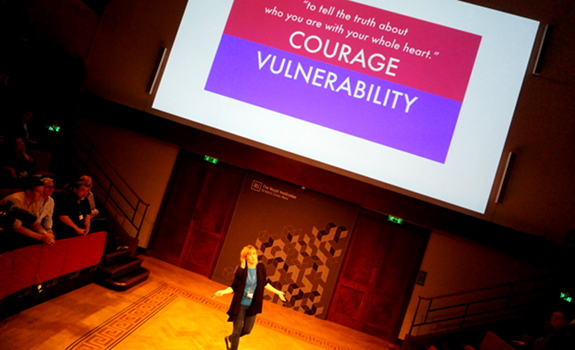
Radio listeners relate to authentic personalities, Key 103 Content Controller Kate Cocker says (photo: Thomas Giger)
Sound natural on air
Cocker has been working with radio presenters during her whole career, producing shows for both BBC and commercial radio in the UK. “It’s my job to make sure that presenters have everything they need to do the job at the best of their ability”, she says about her current role as PD of Manchester’s hit music station Key 103. To help a new jock who was joining their team, she wrote down all essential station formatics (like what to do how, and where in the hour), only to end the list by saying: ‘But you know what? Just be yourself. Be real.’ She loves that radio can create a 1-to-1 human connection: “It is the core of what we do.” In her impression, TV has recognized the power of being real, as we see many completely researched & developed reality shows these days: “The narrative is so familiar that I can watch X-Factor with the sound off, and [still] know what’s going to happen next.” She’s a bit afraid that radio might become over-formatted as well. “Are we getting to a point where we’re smoothing and polishing our radio brands so much that we’re losing sight of what is real?”
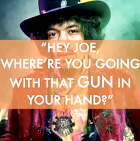 Learn from your mistakes
Learn from your mistakes
On her first day as a producer at BBC Radio 6 Music, she had to control a crisis situation. While the entire news bulletin covered a shooting during the 2011 Norway attacks, the first pre-scheduled song right after the news turned out to be Jimi Hendrix’ Hey Joe – beginning with: Hey Joe, where you goin’ with that gun in your hand? “It was the most mortifying experience of my life”, she recalls. “All I could think of was: I’m going to be on @radiofail!”
Abandon your comfort zone
“I was like: get it off, get it off! The presenter was going: no, no; if we take it off, it looks like we’ve made a mistake. I’m like: you think??? Haha.” They pulled the song during a guitar solo after all, and then there were 3 things she could do: pretend it never happened, blame it on something else, or be honest about it. “I chose to have courage, be vulnerable and tell the truth. The result was amazing.” As a new producer, Kate Cocker didn’t know many people at 6 Music at that point, but once she had shared her painful experience within the rest of the team, everyone seemed to open up. “It was a real; true; human connection. I found out about the person who had said that Dave Grohl was dead – when he wasn’t – and someone who played a song that was so inappropriate that it ended up in The Sun! The key to this connection is courage and vulnerability.” The Jimi Hendrix incident eventually got the station 6 listener complaints: 3 people found it insensitive to play this song right out of that news story, and 3 others were simply annoyed because it got cut off in the middle…
Every single presenter can be himself,
“even within the reality of the format”
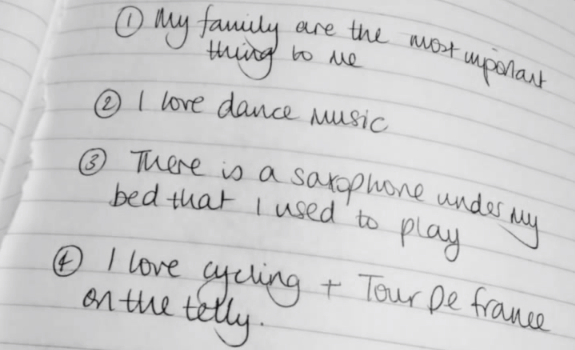
Keeping a list of personal beliefs, interests and hobbies is very useful to build on-air storylines (photo: Kate Cocker)
Forget about radio stereotypes
She feels like courage is basically “tell the truth about who you are with your whole heart” and thinks that vulnerability is connected to “uncertainty, risk and emotional exposure”. If these add up to authenticity, an authentic presenter would be “somebody willing to let go of who they thought they should be in order to be who they are.” In her opinion, “even within the reality of the format”, every single presenter can be himself. 6 Music’s Nemone Metaxas once was struggling to define what she would and wouldn’t talk about in her show: “She just had a baby, and was pregnant again. There were loads of things going on that she wanted to keep off air to protect her family. When you heard her on air at the time, it was very much doing the things she thought she should be doing.” Then, Cocker stumbled upon a TED talk of Sarah Kay with her list of 10 Things I Know To Be True, which got her thinking: “That’s what we’re going to do!”.
 Record authentic life experiences
Record authentic life experiences
She asked Nemone to write down a list of 10 personal facts, and discovered some interesting things. One note was about a saxophone under her bed – leading to the memory of once playing in a band with the guys from Groove Armada. “I said: that’s the stuff; that’s what we want!” It was the start of a story arch, ending with Nemone playing saxophone for the first time in years – live during her radio show.
Expand your creative horizons
Another item on Nemone’s list was her passion for dance music. She had been working for KISS FM and used to be a DJ, but almost no 6 Music listener knew that – so Cocker wanted to build some on-air bits around it. “We did a feature called Vinyl Battleships, where I labeled up her vinyl collection at home.” Listeners would then choose at random from which square case to pick a record. “I told her to record herself in the kitchen, pulling out the records so you could hear the noise, and telling the stories of where she played them; what she had done; where she got it. It just reconnected her, and in truth: she completely lit up.” Nemone eventually went on to present a dance music show on 6 Music. “She is connected with the person that she is; with her passion, and she is now putting it on the radio.”
“It’s about getting under that layer”
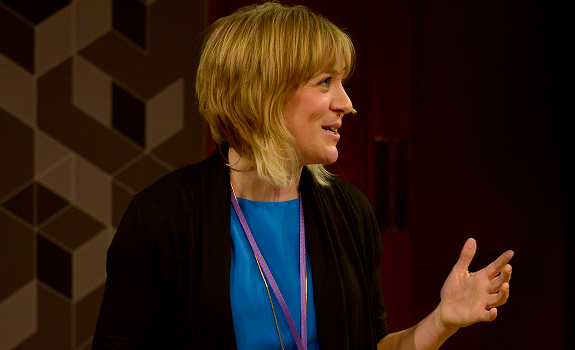
Kate Cocker explains that knowing their personalities helps programmers to empower them (photo: Next Radio)
Have presenters brainstorm regularly
In her current role as Content Controller of Manchester’s hit music station Key 103, she is still using the list technique for her team. “This week, one of my presenters revealed that they’re massively into home improvement. I thought: for crying out loud, I [should] have known that when we had a building merchant come to us the other week to do some [promotion] with us!” She’s learned that it’s good to ask on-air personalities to do this exercise on a regular basis, because answers might change slightly over time. “It’s about getting under that layer.” She points out that writing things down is just a start, as another presenter once made a great list of 38 items. “I said to him: out of those 38 things, how much is going on air; how much do your listeners know? He went: two…”
 Grant personalities creative freedom
Grant personalities creative freedom
Kate Cocker feels that while “being personal is the key to connection”, radio industry consolidation and radio production networking are a serious challenge for radio programmers and producers. Less people are now doing more work, and there are less places to discover and nurture talent. “That list is just a way to get people to reveal themselves to you, so you can encourage and support [them], and let them do the things that they do best.”

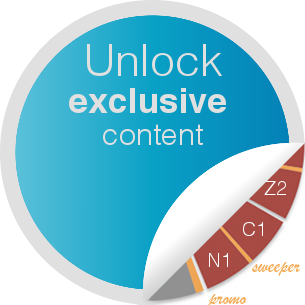



Add Your Comment